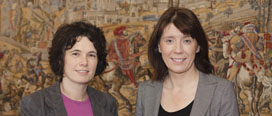2012 Press Releases
New hope for babies with seizures

The new drug is currently in a clinical phase II trial. The first market authorization of the product is expected in 2014.
Researchers at the two universities, industrial partners and scientists involved in the EU programme, NEMO, have been trying to develop an effective antiepileptic drug suitable for the treatment of newborns with birth asphyxia and seizures using innovative strategies targeted specifically to the needs and peculiarities of babies.
The focus on this high risk group is justified because of the poor neurodevelopmental outcome for babies with seizures which are resistant to current anti-epileptic drugs. NEMO is currently undertaking a European-wide multicentre dose finding trial. A randomised controlled trial is planned.
Two pharmaceutical companies are collaborating with the researchers to bring the product to market. Sobi, a biopharmaceutical company specialising in innovative therapies for the treatment of rare diseases has signed a global licensing agreement with the French company Only for Children Pharmaceuticals (O4CP) a partner in the EU financed NEMO project which is coordinated by University College Cork and University College London.
O4CP will be responsible for obtaining market authorizations and for manufacturing the drug. Sobi will commercialize the product on a global basis. The agreement has a value of up to €1.7 million.
"This news comes at a really exciting time in the project. Recruitment is well underway for NEMO at all of our participating centres in Europe. Our collaborators have worked very hard to get the project going and this news is a significant boost to all of this important activity", say Dr Pressler, UCL, and Professor Boylan, UCC.
Seizures in the very young differ from those in adults in terms of causation, clinical features and, perhaps most importantly, long-term consequences. Drug metabolism differs in the young and this can be particularly challenging. According to Professor Boylan, "up to now we have faced an ethical predicament with regard to drug therapy in children and in particular in babies: on the one hand they need protection from the potential risks of unnecessary research, but on the other hand they may be harmed when given inadequately studied medicines. In addition, more effective modern medicines are currently withheld because they have not been studied in this patient group."
Professor Boylan’s previous research has been instrumental in developing methods to detect seizures in newborn babies more accurately and to monitor these seizures. She is acknowledged as an international leader in this area and her research has received a number of major awards.
Neonatal seizures occur in 2-3/1000 births and are associated with both acute mortality and long-term neurodisability. Better treatments for neonatal seizures have been identified as a high priority for research by several international expert groups with the ultimate aim to improve long-term outcome.
